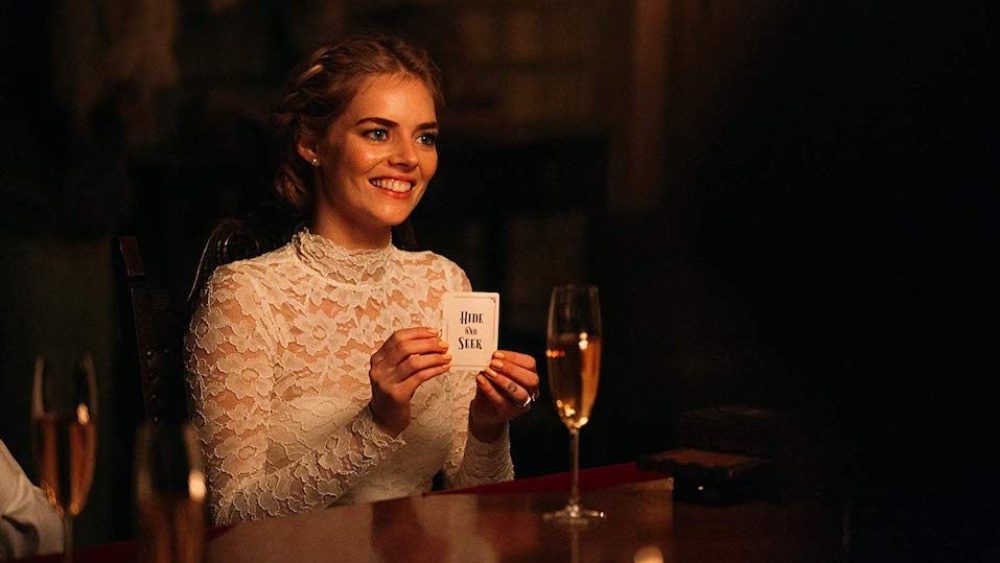A recent spate of horror films have hit the ground running, as it were, taking just enough of their ninety-minute runtime to establish their characters before getting to the nastiness. Ready or Not is one of them, a perfectly paced tale of class warfare and mayhem, in which the villains are a wealthy family willing to torture and sacrifice their victim in order to maintain their power and privilege.
Ready or Not opens with the wedding of Grace (Samara Weaving) to Alex Le Domas (Mark O’Brien), the youngest scion of a wealthy gaming dynasty (“We prefer ‘dominion.’”). The family already have mixed feelings about Grace: Alex’s mother, Becky (Andie MacDowell), thinks she might be the key to bringing Alex “back into the fold,” while his father, Tony (Henry Czerny), thinks she’s a nasty gold-digger out for the family fortune. The other in-laws, including Alex’s brother, Daniel (Alex Brody), feel some sympathy for Grace. But that all goes out the window when they all get together for a traditional family game night on the night of the wedding. Grace draws the Hide and Seek card, inaugurating a ritualistic game in which the family must hunt her down and sacrifice her by dawn.
Ready or Not fully indulges in its nouveau Goth aesthetic. The Le Domases practically live in a turn-of-the-century board game, their mansion decked out in candleabras, hidden corridors, four-poster beds, and ornate wall sconces. Their embedding in tradition is their power and their downfall—they play the game because they believe that they’ll be punished for not playing the game, but bicker regularly about whether they can update the rules (and the weapons). Alex wants to protect Grace, but he also agrees to participate in the ritual, trying desperately to straddle the line between loyalty to his family and their beliefs, and the understanding that what they’re doing is pretty damn horrible.
Which is where Ready or Not locates its themes, in criticism of the insanely wealthy, so embedded in their traditions, rituals, and arcane belief systems that they only vaguely know why they’re playing the game at all. Samara Weaving is superb as a woman who finds herself in totally unbelievable circumstances, making her best efforts to survive. The rest of the cast supports her deliciously, from Kristiian Brunn’s bumbling brother-in-law to Melanie Scrofano’s hysterically inept sister. A lesser cast might have made the film more hokey and less menacing, for Ready or Not treads the line between straighter horror and sheer camp.

The class conflict theme is entirely unsubtle. Grace is a foster child and, while it’s never explained how she and Alex met, she’s not wealthy or particularly privileged. She’s set in contrast with the Le Domases, who themselves never worked for their wealth, per se, but believe quite strongly in noblesse oblige. The showdown between Grace and her in-laws becomes class conflict writ large and in blood.
The body count for much of the film isn’t that high, relying instead on the sudden (and accidental) deaths of the female servants when they’re mistaken for Grace. The film’s emphasis on violence against the female body—including Grace, who is cut, shot, beaten, and injured throughout the film—has been rightly criticized, especially when it comes to the interchangeable servants, whose deaths are (mostly) played for laughs. However, Ready or Not clearly underscores the relationship between class violence and violence against women. All the representatives of the middle and working classes are female, with the sole exception of the butler, Stevens (John Ralston) (more about him in a minute). The family are briefly horrified by the women’s deaths, but the most that they can say is that “she was my favorite one.” All the women are either mistaken for Grace or, in the case of the last one, act as class traitors, attempting to out her to protect themselves (even though they never, technically, targets). The violence against them is played as entertainment by the family themselves—like Grace, they are not important enough for the family to give them more than a passing nod.
There’s a tacit criticism here not just of the wealthy but of those who willingly serve the wealthy. Stevens and the final maid both betray Grace—Stevens actively attempts to capture and kill her; the final maid, with whom Grace attempts to form an alliance, instead tries to out her to the family. Knowing that Grace is in line to be sacrificed to the family’s continued power, the servants either don’t care or act against her, fulfilling their roles as supporters of the wealthy violence of their employers.
Ready or Not is deeply critical of the class structure not just in terms of the power and privilege of the wealthy, but in how that power and privilege is both imposed on and supported by the lower classes. That it folds this critique into a nastier, bloodier version of Clue, in which all but one are the murderers, makes it one of the more deceptively complex and entertaining horror films of the year.


